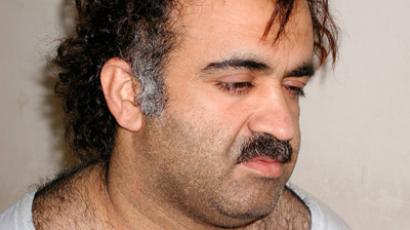Pentagon: 'Gitmo drugged prisoners for their sake…then interrogated'

A recently-released Pentagon report admits to interrogating Guantanamo Bay prisoners after administering mind-altering treatments to them - often forcibly against their will - but stresses it was not done for the purposes of interrogation.
The report by the inspector general of the US Department of Defense obtained by truth-out.org under the Freedom of Information Act, found that some Gitmo inmates were questioned while receiving prescribed psychoactive treatments.The Pentagon has tried to justify the facility staff’s actions, saying that “nowhere in the medical records did we find any evidence of mind-altering drugs being administered for the purpose of interrogation,” as the report states on page 13.“The detainees were not given drugs as a means to facilitate interrogation,” insisted Pentagon spokesman Army Lt. Col. Todd Breasseale. But the report does admit that “certain detainees, diagnosed as having serious mental health conditions being treated with psychoactive medications on a continuing basis, were interrogated.”The inspector general also notes that “numerous” inmates have complained of being medicated against their will, but adds that wardens have used treatments known as “chemical restraints” to quell the aggressive individuals.“Some detainees were involuntarily medicated to help control serious mental illnesses,” says a former commander of the Joint Medical Group at Guantanamo. The report further admits that drugs administered "could impair an individual's ability to provide accurate information."The medication under question, known as Haldol, has been used for over 50 years, and is often administered in psychiatric wards. Several side effects including depression, suicidal behavior and heart attacks are known to exist.The Pentagon spokesman has refused to comment about how often such substances are used at the detention center, where the US has locked up nearly 170 men, writes the Washington Post.Being drugged-up changes nothing?After reviewing the report, David Remes, an attorney of one of the detainees, sounded an alarm saying that there is a vast possibility that statements and evidence obtained from those using psychoactive medication cannot be used in order to justify charging detainees held at the base. The revelations in the study have raised numerous concerns among human rights activists."The inspector general's report confirms that detainees whose mental deterioration and suffering was so great as to lead to psychosis and attempts at self-harm were given anti-psychotic medication and subjected to further interrogation,” Leonard Rubenstein, a medical ethicist at Johns Hopkins Center for Public Health and Human Rights, told truth-out.org.However, some stipulate that evidence obtained through these methods would hold up in court.Shayana Kadidal, from the Center for Constitutional Rights says that under the system set up by the US Court of Appeals for the District of Columbia, any statements detainees made during these interrogations would be presumed accurate “even if detainees took medication that could produce unreliable information."Kadidal added that "the burden ends up falling upon the detainee to prove what was said wasn't accurate if they were challenging their detention in habeas corpus proceedings.”














